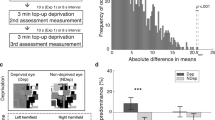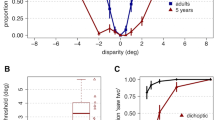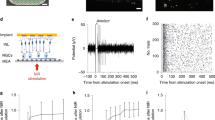Abstract
AMBLYOPIA in children aged about 6 yr can be rapidly diminished by stimulating the amblyopic eye alone with rotating disks of square-wave gratings1. Such exposure for four periods each of 7 min has brought many of the patients up to 6/6 acuity, in some cases, after ‘patching’ of the good eye had been largely ineffective. However, in children of this age, the ‘critical period’ has probably passed. We decided to study the effects of presenting rotating gratings during the critical period, when the visual system is known to be acutely sensitive to visual deprivation. Could changes in the ocular dominance of cortical neurones be induced even in the relatively unfavourable conditions of moderate to light anaesthesia? We report here that monocular deprivation of 2–3 d in young lambs results in a marked decrease in the number of cells in the primary visual cortex which can be stimulated through the deprived eye, but that this can be rapidly increased by subsequent brief exposure of the deprived eye to a rotating square-wave grating. We chose to work on lambs and a pygmy goat in which one eye had been closed for a few days shortly after birth because we thought that such treatment would leave few cells driven initially by the deprived eye. As the visual cortex at that time is showing its greatest plasticity, it seemed likely that short exposures to the gratings would then have their greatest effect on the ocular dominance. Others had used repeated stimulation by moving bars on single cells of normal animals, but had obtained rather slight and transient effects2. We hoped to obtain reasonable changes in eye dominance during the limits of single acute experiments. Seven animals were used. They had normal binocular visual experience until the 4th day of life and were then monocularly deprived for either 2 (nos 1–4) or 3 (no. 5) d, after which they were anaesthetised and used for the experiment.
This is a preview of subscription content, access via your institution
Access options
Subscribe to this journal
Receive 51 print issues and online access
$199.00 per year
only $3.90 per issue
Buy this article
- Purchase on Springer Link
- Instant access to full article PDF
Prices may be subject to local taxes which are calculated during checkout
Similar content being viewed by others
References
Banks, Ruth V., Campbell, F. W., Hess, R. & Watson, P. G. Br. orthop. J. 35, 1–12 (1978).
Pettigrew, J. D., Olson, C. & Barlow, H. B. Science 180, 1202–1203 (1973).
Merrill, E. G. & Ainsworth, A. Med. biol. Engng 10, 662–672 (1972).
Pettigrew, J. D. & Garey, L. J. Brain Res. 66, 160–164 (1974).
Movshon, J. A. & Blakemore, C. Nature 251, 504–505 (1974).
Kasamatsu, T. & Pettigrew, J. D. Science 194, 206–209 (1976).
Hubel, D. H. & Wiesel, T. N. J. Physiol., Lond. 160, 106–154 (1962).
Author information
Authors and Affiliations
Rights and permissions
About this article
Cite this article
MARTIN, K., RAMACHANDRAN, V., RAO, V. et al. Changes in ocular dominance induced in monocularly deprived lambs by stimulation with rotating gratings. Nature 277, 391–393 (1979). https://doi.org/10.1038/277391a0
Received:
Accepted:
Issue Date:
DOI: https://doi.org/10.1038/277391a0
This article is cited by
-
Treatment for amblyopia with rotating gratings and subsequent occlusion: a controlled study
International Ophthalmology (1981)
Comments
By submitting a comment you agree to abide by our Terms and Community Guidelines. If you find something abusive or that does not comply with our terms or guidelines please flag it as inappropriate.



